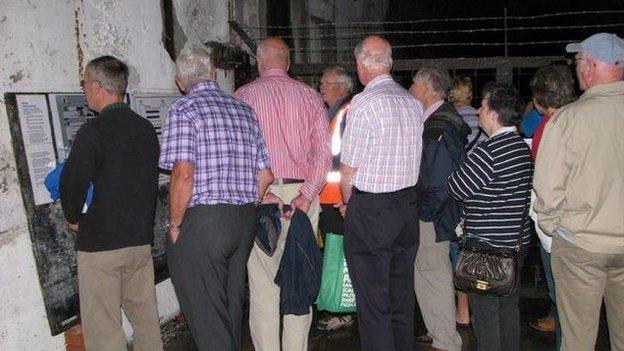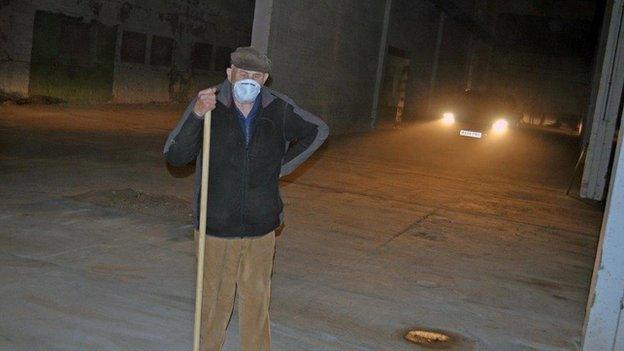Bats halt tours at Rhydymwyn WW2 'atomic' research site
- Published

The history society gives tours of the vast underground site
Roosting bats are preventing access to a former top secret World War Two munitions bunker that was home to research on the first atomic bombs.
A historical society which offers trips of the site at Rhydymwyn, near Mold, say the restrictions are unnecessary.
The group have called for site owner Defra to lift the ban in time for the 70th anniversary of the bomb test that formed part of the Manhattan Project.
Defra said it was vital to protect sites that are home to bats.
The Rhydymwyn Valley Works Site in Flintshire has been open to the public as a nature reserve since 2003 and its history can be traced back to a foundry in 1747.
In World War Two it was used for making mustard bombs and smoke grenades for the allied forces and its location was so secret it did not figure on any local maps.

"There is no reason why we can't continue to pick it up again if someone takes a more reasonable view."
Colin Barber, chairman, Rhydymwyn Valley History Society

In 1942, as part of Britain's highly secretive Operation Tube Alloys project, work into producing weapons-grade uranium with atomic potential started there.
Many of the scientists who worked on Operation Tube Alloys worked on the Manhattan Project, which developed the first atomic bomb.
The research was conducted in Building 45, which was listed in 2008.
The bat protocol order introduced in 2012 prevents people entering Building 45 between April to November each year.

Defra recently gave permission for volunteers to clean the site
"We showed due diligence. We knew the bats were in the buildings. We are confident that numbers increased during this period and there wasn't any real reason why we should have been excluded from taking the parties round," insisted the history society's chairman, Colin Barber.
"And there is no reason why we can't continue to pick it up again if someone takes a more reasonable view."
More than 60 species of bird, including kingfishers, have been identified at Rhydymwyn as well as 150 species of flowers and signs of otters.
Defra said it is an offence to disturb bats and affect their ability to roost.
It said: "Access to Building 45 is only restricted during the months of the year when the creatures are roosting."
It added: "Defra owns the Rhydymwyn site, and we take advice on its management from Welsh bodies such as Natural Resources Wales.
"Bats are protected by law, which means we need to close Building 45 at certain times of the year. Any landowner in the same position would be legally obliged to take the same decision."
A spokesperson for Natural Resources Wales said it had nothing further to add to Defra's comments.
- Published2 June 2010